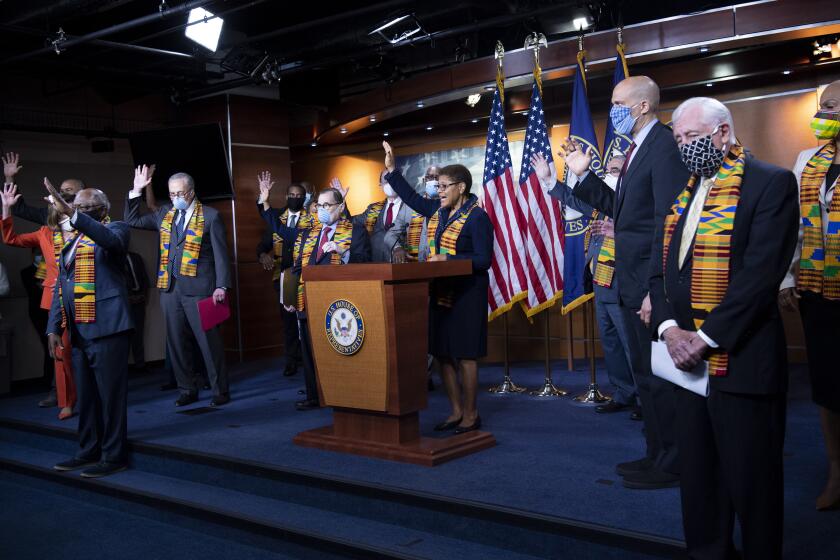GOP unveils police reform bill as Democrats move to advance theirs

- Share via
WASHINGTON — Greater disclosure of police use of force and no-knock warrants, as well as financial incentives for local law enforcement departments to ban chokeholds, are the centerpieces of a Senate GOP policing reform bill announced Wednesday.
The Senate bill, and a separate measure being considered in the House, are the congressional responses to the national racial-justice protests that have emerged following the death of George Floyd in the custody of a Minneapolis police officer. The protests, and the video of Floyd pleading with the officer to remove his knee from Floyd’s neck, have spurred a national conversation about police use of force and training standards for officers.
“It’s so important for us to say that we hear you. We’re listening to your concerns. The George Floyd incident certainly accelerated this conversation,” Sen. Tim Scott (R-S.C.) said while unveiling his policing proposal Wednesday morning at a news conference with Senate Majority Leader Mitch McConnell (R-Ky.) and other Senate Republicans.
The legislation includes emergency grant programs to increase the use of body cameras on officers, makes lynching a federal hate crime and creates a commission to study the social conditions and discrimination facing Black men and boys.
The Senate will hold a procedural vote on Scott’s bill next week, McConnell said. But it remains unclear whether the measure will have enough support from Democrats to meet the 60-vote threshold to advance.
“Our Democratic friends,” McConnell said, “if they want to make a law and not just try to make a point, I hope they’ll join us in getting on the bill and trying to move forward.”
Democrats derided Scott’s bill as a watered-down version of their own plan. Senate Minority Leader Charles E. Schumer (D-N.Y.) threw cold water on the bill but did not say that Democrats would block the procedural vote next week.
“The Senate Republican proposal on policing does not rise to the moment,” Schumer said. “The real challenge is whether Senate Republicans will be able to step up to the plate and rise to the moment and vote for a bill that actually solves the problem.”
White House Press Secretary Kayleigh McEnany said the president supports Scott’s bill.
The House Judiciary Committee conducted a series of amendment votes Wednesday and was on track to advance the Democrats’ bill, setting up a full vote in the House as soon as next week.
The House legislation, sponsored by House Congressional Black Caucus chairwoman Rep. Karen Bass (D-Los Angeles), would ban federal officers from using chokeholds and predicate federal funding on whether state and local officials follow suit. It would limit so-called qualified immunity for police officers, which has made it harder for victims of brutality to file civil lawsuits for excessive force, and stop no-knock warrants in federal drug cases. It would also create national accreditation standards for police.
Los Angeles Rep. Karen Bass has worked on police abuse issues for 47 years. Now she’s in charge of House effort to enact it into law.
Leaders in both chambers say they recognize the momentum of the moment and have indicated they want to get legislation to the president’s desk by July 4. Though the two proposals remain far apart, senators and representatives pointed to similarities.
Both the Senate GOP and House Democrats’ legislation would link federal funding — which many local police departments rely on — to their use of chokeholds.
The GOP bill prohibits federal grant money to departments unless they have a policy banning the “use of chokeholds except when deadly force is authorized.” The Democratic bill prohibits those same grants, unless the state has a law in place banning chokeholds or carotid holds, and bans the use of no-knock warrants for drug crimes.
Scott’s bill focuses on collecting data about how and when force is used, which Scott said is needed before Congress imposes outright bans on chokeholds and limits on no-knock warrants. He said only about 40% of departments voluntarily provide use of force data to the FBI.
Both would make lynching a federal crime, a move that passed the House with bipartisan support, and has strong support in the Senate. Its passage in the Senate was recently blocked by Sen. Rand Paul (R-Ky.).
But major differences remain.
Scott called the qualified immunity reforms in the House bill a “poison pill,” and the White House has called it nonnegotiable. Democrats call it integral to holding officers accountable for bad behavior and blocked an attempt to remove it from the House bill Wednesday. Republicans attempting to remove it urged the committee to first study the effect of removing the doctrine.
Qualified immunity holds police and other officials immune from federal civil lawsuits unless their actions violated clearly established legal precedents at the time. Democrats say the doctrine has been twisted by courts to make it nearly impossible to hold officers to account by requiring an extremely precise match between the details of an incident of police misconduct and that addressed in a previous case.
Some police departments and unions warn it will be difficult to recruit officers with the knowledge that they might be held personally liable.
While both bills create databases of police misconduct or disciplinary records to prevent problem officers from moving between departments, the Democrats’ bill makes it national and public, while the GOP bill requires departments to make the records available to other law enforcement agencies.
“There’s a lot of overlap, but there’s some real differences,” said Senate Judiciary Committee Chairman Sen. Lindsey Graham (R-S.C.). “And how do you hammer out those real differences? You talk to each other.”
Bass said knowing that some aspects of her bill were included in a form in the Senate proposal “makes me feel like there is a pathway for us to do this.”
More to Read
Get the L.A. Times Politics newsletter
Deeply reported insights into legislation, politics and policy from Sacramento, Washington and beyond. In your inbox twice per week.
You may occasionally receive promotional content from the Los Angeles Times.












